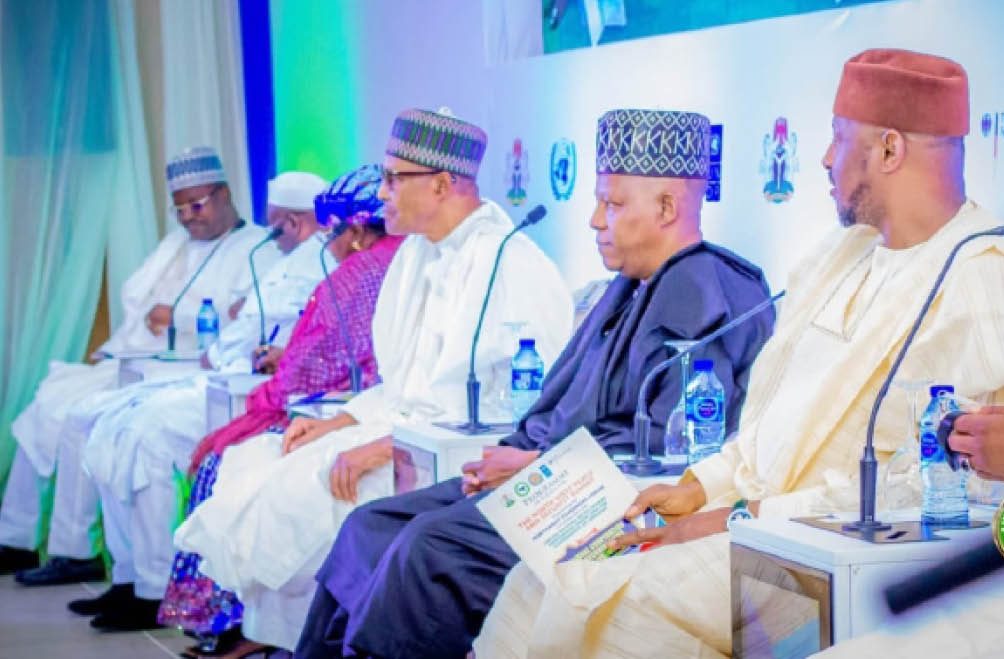President Bola Ahmed Tinubu yesterday emphasised the importance of regional cooperation and unity in addressing the security challenges facing North-west region, saying “enough is enough”.
“We have come to say: enough is enough,” President Tinubu declared, announcing a pivotal decision to involve local leaders from the North-west and North-east in the region’s defense and security.
Tinubu, represented by the Vice President, Kashim Shettima, said this while presenting a keynote address at the North-west Peace and Security Summit holding in Katsina.
The two-day event, themed, “Regional Cooperation for Securing Lives and Livelihoods in North-West Nigeria,” saw key stakeholders from various sectors come together to discuss strategies for stabilising the region.
The president highlighted the cultural bonds and shared interests that unite the people of Northern Nigeria, extending beyond the Niger River and across national borders.
He acknowledged what he called the profound sense of unity among the northern communities and maintained that the security issues in the region have far-reaching implications for the entire country.
“We have long established that whatever ails any part of this federation destabilises the other. So, the issue of national security in the North-west is not a sectional agenda,” President Tinubu stated.
While reiterating the government’s commitment to making Nigeria safer, President Tinubu outlined a comprehensive approach to achieving peace in the region, which involves addressing historical injustices, reversing institutional weaknesses in security, and countering harmful ideologies.
He noted the impact of farmer-herder conflicts, exacerbated by climate change and resource scarcity, and the proliferation of unauthorised arms and criminal activities that have destabilised communities.
He noted the success of military operations such as Operation Hadin Kai and Operation Safe Haven in targeting criminal groups like Boko Haram and bandits.
The president also emphasised the need for a multi-faceted strategy, combining military action with police reforms, local policing enhancement, peace-building programmes, dialogue promotion, and educational campaigns.
He highlighted a roadmap for integrating military, political, and socio-economic strategies, enhancing cross-border cooperation, and investing in youth empowerment and education.
Among the non-kinetic measures, President Tinubu introduced the Pulaku resettlement initiative aimed at addressing root causes of disputes and insecurity.
“This initiative will pilot in Sokoto, Kebbi, Benue, Katsina, Zamfara, Niger, and Kaduna States, focusing on building residences, roads, schools, and essential facilities to foster sustainable development and unity.
“We cannot achieve the triumph we desire without any part of the nation being secure,” President Tinubu concluded, urging all stakeholders to acknowledge their shared destiny and work collectively towards a stable and peaceful Nigeria.
The summit’s discussions are expected to refine strategies and ensure the North-west’s stability contributes to the nation’s overall security.
Gov. Radda calls for collective action
Governor Dikko Umaru Radda of Katsina State has emphasised the unity and shared aspirations that bind the North-west region, calling for collective action to address the pressing challenges.
Speaking at the North-west Peace and Security Summit, Governor Radda focused on the region’s critical issues of insecurity and development.
He outlined the forum’s proactive steps, including visits to the President of the African Development Bank and meetings with United Nations leadership to seek support for regional development.
“Our effort to tackle security took us to Washington D.C., where we informed the United States Institute for Peace of our ongoing plans,” he said.
Acknowledging the federal government’s role in security, Governor Radda expressed gratitude to President Bola Ahmed Tinubu for his leadership.
“I recall speaking with him after an attack a few months ago and his prompt response to the matter. He has continued to engage with me and is equally committed to securing lives and livelihoods in the region,” Radda said.
He also commended the Nigerian Army, Air Force, and other security agencies for their relentless fight against insecurity in Katsina.
Governor Radda recognised the National Assembly’s efforts in establishing the North-west Development Commission, aimed at promoting inclusive growth and providing resources for non-kinetic security measures.
“This laudable effort will provide the much-needed resources for fighting insecurity,” he stated.
On the menace of banditry, Governor Radda called for a multifaceted approach, including robust intelligence gathering, community policing, and advanced security technologies.
“We must enhance the capacity of our national security forces through continuous improvements and adequate resources,” he added.
Governor Radda stressed the importance of community engagement in combating banditry, saying, “we must engage with local communities, traditional rulers, and religious leaders to foster a culture of cooperation and trust”.
He highlighted successful community security initiatives in Katsina and other states in the region, where local outfits work in collaboration with formal security forces.
He called for investments in modern agricultural practices and rural infrastructure to boost productivity and improve food security.
“Improving rural roads will facilitate the transportation of agricultural produce to markets, reducing post-harvest losses and increasing farmers’ incomes,” he said.
The governor then emphasised the need for regional cooperation and collective action, saying, “the challenges we face are not confined within state borders; they are regional in nature and require a coordinated response”.
He called for the establishment of joint task forces to tackle specific issues like banditry and food security, ensuring well-coordinated and effective responses.
“Together, we can transform the North-west into a beacon of hope and progress for the nation. Let us build a region where every citizen can live in peace, agriculture thrives, socio-economic justice prevails, and poverty is a thing of the past,” he said.
We need to revive traditional conflict resolution mechanisms – German Ambassador
The German Ambassador to Nigeria, Aneta Günther, has emphasised the need for the revival of the traditional conflict resolution mechanisms in order to achieve lasting peace and security in the North-west region.
The Ambassador, who was represented by an official of the embassy at the North-west Peace and Security Summit, harped on the need for traditional conflict resolution mechanisms, adding that when such mechanisms are given the necessary resources, they are best suited to resolve conflicts before they escalate.
“Unfortunately, these traditional methods that existed for decades are now in peril, but we need to revive them in order to bring peace forward,” she said.
She also underscored the importance of basic state services such as education, security, healthcare, infrastructure and other necessities such as security as a way of ensuring peace in the region.
“We are all aware of the enormous challenges that plague the North-west and the wider region and we need to overcome these challenges if we want to go forward to offer a future for this region and its inhabitants. The question is what do we do to achieve this? And this summit is the beginning, hopefully, for the solution,” she added.
North-west has potentials for brighter future – UNDP Rep
The United Nations Development Programme (UNDP) Resident Representative in Nigeria, Ms Elsie Attafuah, who also spoke at the event, said the North-west deserves a brighter future and the region has the potentials to achieve that.
Ms Attafuah said if Nigeria is to fulfill its promise as the giant of Africa, adequate attention must be given to the North-west, which has close to 30 per cent of the nation’s population.
She said with close to 40 mineral deposits, effective management and governance of such resources with appropriate beneficiary mechanism will not only enrich the progress of the region, but also pave the way to prosperity.
She maintained that the great potential that is in agriculture, if effectively harnessed could propel the region to new heights of development.
“When you talk of energy, the region is sitting on a goldmine of renewable energy potential. Investing in renewable energy is not only a move, it is like finding money in your old jacket, “ she said.
She added that to achieve the desired outcome, the youth in the region must be empowered and supported.
“This summit is, therefore, a vital step towards promoting development and deepening the foundation of peace in the region that has seen more than its fair share of challenges,” she said.
She said the summit could focus and capitalise on the untapped potentials of the region through the intertwined context of peace, security and development, which according to her, are inseparable and equally important.

 Join Daily Trust WhatsApp Community For Quick Access To News and Happenings Around You.
Join Daily Trust WhatsApp Community For Quick Access To News and Happenings Around You.


